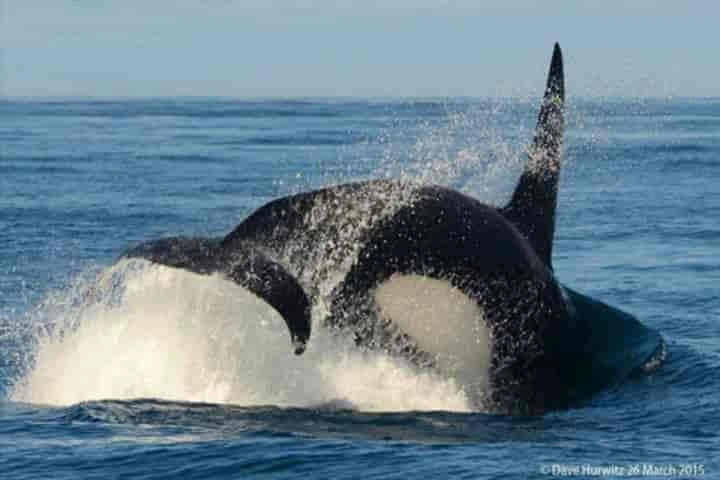It reads like the plot of a Western spaghetti film or Indian pot boiler movie where two characters terrorise a community. Much like them in the waters of Gansbaai coast, 120 kilometres east of Cape Town, South Africa, a pair of male orcas or killer whales – Port and Starboard — have killed at least eight great white sharks and sent a wave of fear among them.
As per a report in livescience.com, the two went beyond just annihilating the great whites. They tore these ferocious creatures open to eat their livers, all except one. In the case of some sharks, who had been found dead and shredded, their hearts were missing.
Killer whales are known to eliminate anything and everything. It could range from small fish to huge sharks to sea lions and blue whales too. Yet, what these two orcas are doing is impacting majorly the habitat they dwell in, as per the authors of this new study which was published in African Journal of Marine Science.
The repercussions of this killing spree as per researchers has reduced sighting of great white drastically in the region in the last five years. They used long-term sightings and data gathered from tags to deduce that sharks numbering in dozens are deliberately avoiding Gansbaai coast when they sense that the hunters are around. Interestingly, this region has been historically dominated by the great whites.
The authors of the study mentioned that because of the presence of great whites throughout the year in Gansbaai, it has become a favourite haunt of shark watchers.
In a statement, Alison Towner who is a senior biologist observed: "What we seem to be witnessing though is a large-scale avoidance strategy, mirroring what we see used by wild dogs in the Serengeti in Tanzania, in response to increased lion presence. The more the orcas frequent these sites, the longer the great white sharks stay away."
Towner studies white sharks at South Africa’s Dyer Island Conservation Trust.
The length to which the great whites can reach is 16 feet while they have many rows of serrated and knife-like teeth numbering 300. All this makes them the oceans’ top predators till the orcas happened in 2015.
Both these killers can be easily identified due to their battle scars. One has his dorsal fin bent to left while the other has it caved in on the right. Hence their names Port and Starboard. Every time the two are spotted, a dead white shark washes up on the beach.
Five whites were found dead between 2016 and 2017. Four had their bodies ripped apart with the livers pulled out. The shark livers are big and fatty providing much needed energy and nutrition. The death of each of these sharks coincided with sightings of Port and Starboard. Officials feel many more shark bodies may have been lost in the sea.
Also read: Study confirms killer whales hunt in packs to feast on Earth’s biggest creature – the blue whale
The change in the behaviour of whites was evident in six months after the first killing as their daily sightings dropped from six to one. Shark detections by tags too came down. Before the attack three to eight sharks which had been tagged were located daily in the region and this came down to zero for many months. Individual sharks had been found to have swum hundreds of miles away from Gansbaai and in some cases they stayed away for six months or even more before coming back.
This displacement has a direct effect on the ecosystem, the scientists said. The most noticeable was the spotting of bronze whaler shark or Carcharhinus brachyurus, a mid-level predator who filled in the spot vacated by the whites. Earlier they became a meal of whites but with their predators mssing they have increased in numbers. The research teams observed that this could create a ripple through the complete food chain.
Usually the orcas, though known to be vicious, don’t attack the great whites. The scientists have detected a rare flat-toothed sub-species among them in South Africa who are specialists in shark hunting. Maybe Port and Starboard hail from this group. Their presence in the region could be ascribed to “a decline in prey populations including fishes and sharks, causing changes in their distribution pattern," remarked Towner.
The murder mystery needs further probe to understanding the plot fully.




















